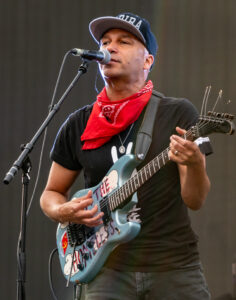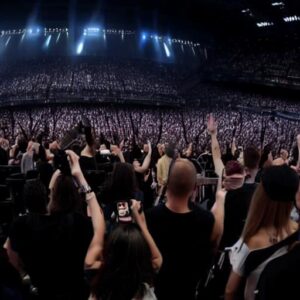The first time I encountered facial recognition technology, which I was aware of at least, was a few weeks ago as I was boarding a plane at Regan National Airport. I must admit, I was a little unnerved by it. The idea that a machine could scan and identify my face felt intrusive and unsettling, even though I can understand why it was being deployed in the case of air travel. Thank you, Saudi Arabia.
Fast forward to today, and facial recognition technology has become increasingly prevalent in our society. From airports to shopping malls and even concerts, this technology is being utilized in various domains. However, the more we delve into its applications, the more evident the downsides become.
The fact that it is being used in the music industry, of all places, is particularly concerning. Concerts are supposed to be a place where people can let loose and be themselves, without fear of being monitored or tracked. Facial recognition technology could have a chilling effect on free expression and assembly.
Consider this scenario: you attend a concert, and your face gets scanned and stored in a database without your knowledge or consent. This information could potentially be exploited to track your movements or identify you at other events. Such a prospect poses a threat to our fundamental rights of free speech and assembly. Police in Cardiff recently used facial recognition to identify people going to a Beyonce concert. Taylor Swift started using the technology as far back as 2018 in order to spot stalkers. And Madison Square Garden used it to ID lawyers attending functions at the Garden who are involved in lawsuits against the company. In short, it sucks.

Moreover, the accuracy of facial recognition technology remains questionable. Numerous studies have demonstrated its tendency to misidentify individuals of color, disproportionately affecting them compared to their white counterparts. This inherent bias opens the door to discrimination and exacerbates existing social inequalities.
Given these concerns, it’s extremely important that we approach facial recognition technology with caution. We cannot afford to let it erode our privacy or perpetuate discrimination. A digital rights advocacy group called Fight for the Future organized over 100 music artists to boycott concert venues employing facial recognition technology sending a clear message: we will not tolerate its use to violate our privacy or discriminate against us. It is time for us all to support this boycott and demand stricter regulations governing the use of this technology.
The path forward for facial recognition technology remains uncertain. Some proponents argue that it holds the potential to enhance our lives by aiding law enforcement in identifying criminals, preventing terrorist activities, and offering personalized services. In fact, the FBI has used facial recognition software to identify many of the violent January 6th insurrectionists. This is a very valid use case and I support it 100%. However, there is a growing concern among others about its potential for surveillance and privacy infringement. They fear that this technology could be exploited to track our every move, unveil our political affiliations, and further discriminate against us.

As we stand at this technological crossroads, it is crucial to acknowledge both the risks and benefits associated with facial recognition technology. We must engage in an open and inclusive public debate, ensuring that any deployment of this technology is done responsibly, with safeguards in place to protect our privacy and prevent discrimination. The future of facial recognition technology is yet to be determined, but it is our responsibility to shape it in a way that aligns with our values and protects our rights.
The US Congress has started to study AI with an eye toward regulation. Perhaps they’d be well advised to expand those efforts to include facial recognition. Things are getting downright Orwellian out there. Really.
Finally, I’d like to pose one question: does the music industry really need facial recognition technology? I don’t think so. Personally, I find the idea repulsive. But hey, you may feel differently.


